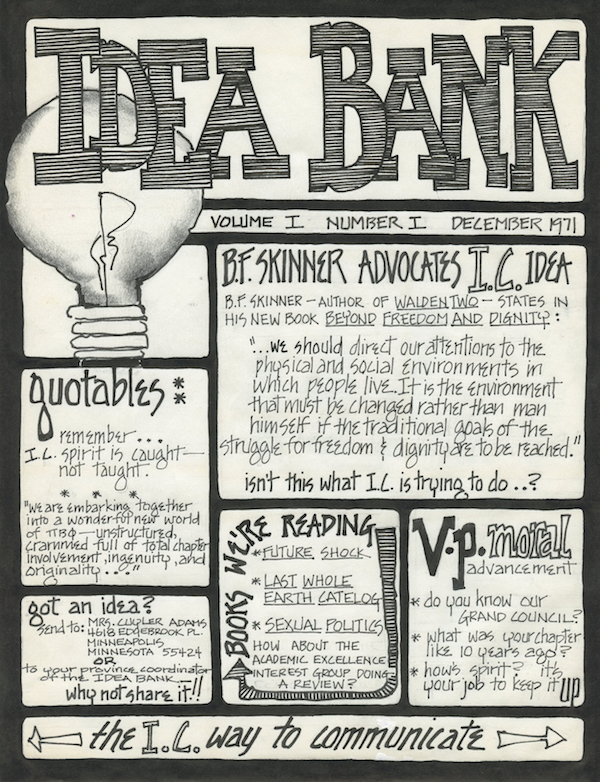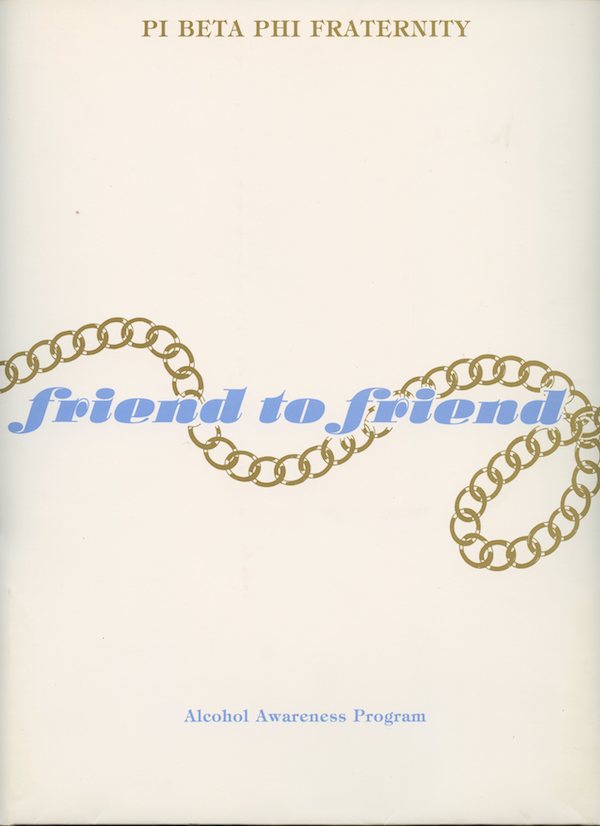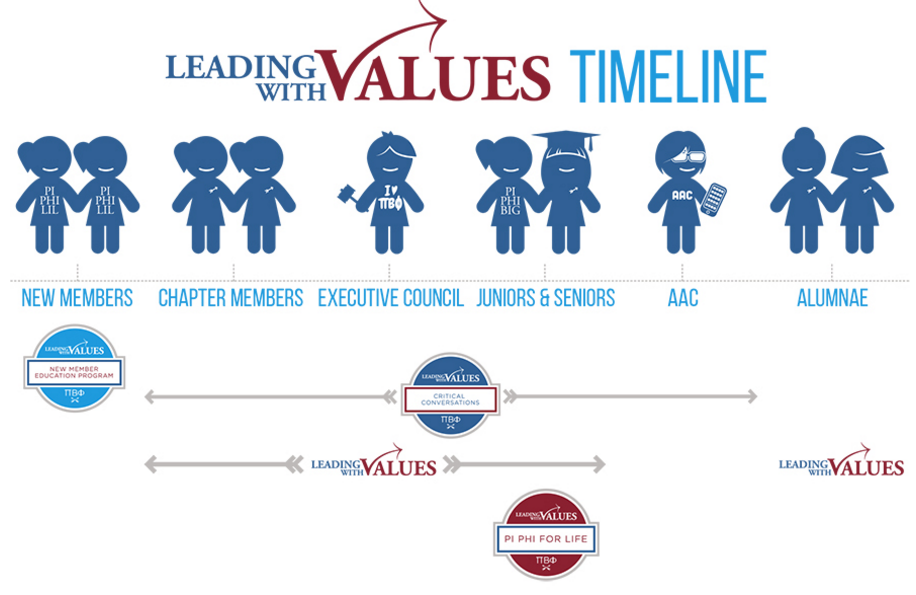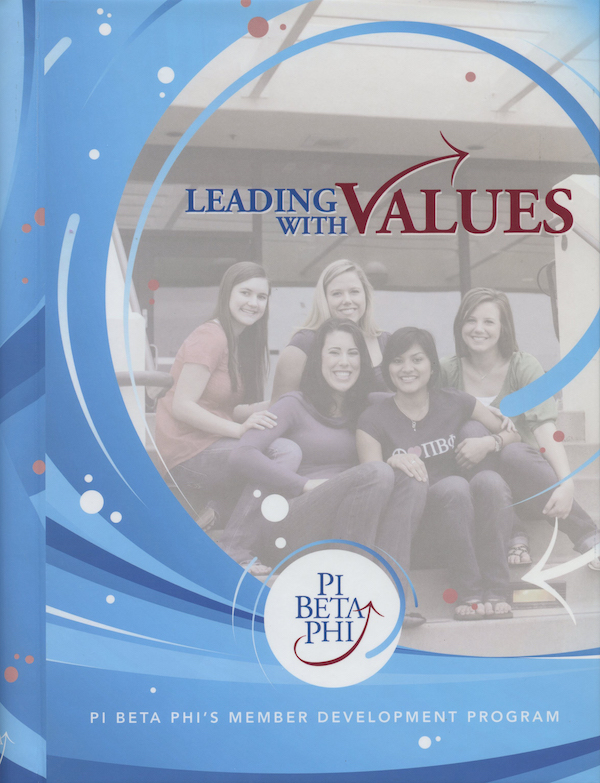programming
Programming offers members a way to engage in conversations about personal, intellectual and professional development as leaders and as dedicated members of their communities.
Programming offers members a way to engage in conversations about personal, intellectual and professional development as leaders and as dedicated members of their communities.

Programming has always played a large role in the Pi Beta Phi membership experience. From the organization's beginnings, chapters have done philanthropic work, but there was no commonality in service until 1910, when the convention body voted to establish and support a Settlement School. The school opened in 1912 in Gatlinburg, Tennessee, and chapters supported the school through fundraisers, sending books and supplies and encouraging alumnae to serve as teachers and staff members.
As for a standardized member experience, the Initiation ceremony was officially adopted in 1890. Examinations were given to the women who pledged themselves to the organization, and before they would be initiated, they needed to be familiar with the organization's history and purpose. The New Member orientation and New Member Education Program have evolved over the years. While much information was shared through letters, documents and word of mouth, the Fraternity started seeing shared chapter and member development programming in print in the 1970s.
In the 1970s a newsletter of programming ideas called, “Idea Bank” debuted. Chapters submitted their information to the National Coordinator of the Idea Bank Committee to be featured. These ideas ranged from New Member education and philanthropy projects to academic and recruitment programming.
After this initial implementation of “Idea Bank,” there was an Idea Bank Procedure notebook put together that outlined details of five separate parts of programming: Fraternity Heritage, Fraternity Orientation, Rush, General Chapter Programming and Mental Advancement. This notebook was utilized in the 1970s through 1990s and was extremely detailed.
Toward the end of Idea Bank two other Pi Beta Phi programs were established, “Friend to Friend,” Pi Phi’s Alcohol Awareness Program in 1984 and “Aiming Straight,” Pi Phi’s Drug Awareness Program in 1987. “Friend to Friend” was an educational tool designed to help Pi Phis accomplish the following goals:
 This program was packaged in a trifold with many resources, including background information, workshops and supplemental materials.
This program was packaged in a trifold with many resources, including background information, workshops and supplemental materials.
“Aiming Straight” was required for chapters to participate in at least once a year. It included a 25-minute tape that informed collegians about the adverse effects of drugs. It was accompanied by a three ring notebook of educational and biographical resource materials.
“Friend to Friend” was revamped in 1994 to include both alcohol and drug awareness program. While it included many of the same type of resources, like background information, workshops and supplements, they held up-to-date information for the 1990s.
In 1995, “Images” became another large part of Pi Phi collegiate programming. “Images” included facts, checklists, study cases, pamphlets and more on eating disorders.
In 2002, Pi Beta Phi’s first Values Workshop was released, “Living Our Values.” Traveling Graduate Consultants (now called Leadership Development Consultants) were instructed to hold this workshop on their chapter visits, with the Collegiate Province President to provide support. Some of the key objectives of this workshop were as follows:
Living with Values would soon be transformed into what it is known as today, Leading with Values®. The launch of Leading with Values in 2003 included focused efforts on organizational knowledge, good citizenship, intellectual development and leadership development. At its beginning, it was a four-year program that’s two key components were the New Member Program and Pi Phi for Life.
It wasn’t until a revamp in 2009 that the Leading with Values seminars began to look like what is presented today. Leading with Values seminars offer collegians a way to regularly engage in conversations pertinent to the development of collegians personally, intellectually, professionally, as leaders and as dedicated members of their communities. The intent is for collegians to see the connection between Pi Phi's core values, Leading with Values seminars and real-life scenarios.

Today, chapters are encouraged to facilitate Leading with Values seminars relevant to their unique needs. These seminars are intended for the development of the individual member and cover topic areas such as life skills, community engagement, navigating bias and more. Leading with Values programs may range anywhere from 20 to 40 minutes and are typically facilitated by a chapter member.
From 2014–2015, the components of Leading with Values continued to grow and develop. In 2014, the New Member Education Program was revised to incorporate a blended learning approach and utilize Pi Beta Phi’s Online Learning Center as well as in-person New Member meetings. The online courses are designed to teach the members factual information about the Fraternity and their obligations, while the in-person meetings connect that information with their specific chapter and provide bonding opportunities for their New Member class. The program is centered around the core values of the organization, obligations of membership and sisterhood.

In 2015, senior programming, Pi Phi for Life, was revamped. The core component of Pi Phi for Life is three Signature Workshops that members experience during their final semesters as a collegian. These workshops replace a regular chapter meeting and provide space for members of the class to reflect on their Pi Phi experiences, their lasting legacy and giving and serving as an alumna. The workshops are delivered by the Director Lifelong Membership, an elected chapter officer. Each workshop is accompanied by a special video message from Pi Phi alumnae.
Also in 2015, Pi Beta Phi’s risk prevention education programming Critical Conversations® was launched. Its comprehensive approach educates members on topics such as alcohol and other substance use, mental health, sexual assault, bullying, personal safety, accountability and more while integrating Pi Phi values. The program offers a wide variety of tools and resources, addressing the unique needs of our members and their support systems and engaging them in the prevention-education process.
Critical Conversations programming include a Speaker Series, webisodes shared at chapter meetings, Alumnae Advisory Committee (AAC) topic briefs, New Member Education and CommunityEdu. Through engagement in Critical Conversations, members will become:
The implementation of Critical Conversations programming is overseen and managed by the chapter’s Vice President Risk Management and Director Policy and Prevention Education. The Fraternity’s goal is to ensure each chapter will receive one Speaker Series program during the academic year. Additional resources are intended to enhance current prevention and policy education.
In 2020, Pi Beta Phi emphasized the commitment to addressing recruitment practices to drive inclusivity, which includes annual pre-recruitment bias training for our collegians and AAC members who assist with recruitment activities, whether it be a formal recruitment, Continuous Open Bidding, in-person or virtual. There is a mix of personal and group sessions, as well as suggested follow-up dialogue. Each session also includes a survey to help Pi Beta Phi continue to evolve and update future resources.